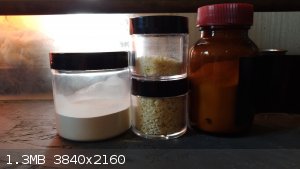XeonTheMGPony
International Hazard
    
Posts: 1640
Registered: 5-1-2016
Member Is Offline
Mood: No Mood
|
|
Anhydrous aluminium Chloride and more!
Well My anhydrous aluminium Chloride finally arrived, paper disintegrated on packaging and stickers discoloured, oh boy not good signs!
So on comes the dehumidifier and let that run for an hour to dry the lab out, I sieve it, I recover 3 portions.
Portion 1, Anhydrous and good appearing quality, not much but enough.
Second portion is discoloured yellow, obviously damp with some fuming of HCl that is int he brown bottle
Third portion dam right damp and clomped it is int he 2 smaller bottles.
Now my next question is I need to make ChloroBenzene for my DDT Synth, How sensitive is this to moisture? As if possible would like to be able to put
the slight damp stuff to work so it isn't total loss!

|
|
|
paulll
Hazard to Others
  
Posts: 112
Registered: 1-5-2018
Member Is Online
Mood: It's fine. Really.
|
|
Is there an advantage to using Aluminium chloride in this synth? I'm looking at it myself in the very near future, but with ferric chloride.
|
|
|
DraconicAcid
International Hazard
    
Posts: 4356
Registered: 1-2-2013
Location: The tiniest college campus ever....
Member Is Offline
Mood: Semi-victorious.
|
|
Ferric chloride is a milder catalyst, but one would think that chlorine is reactive enough that it wouldn't matter.
Please remember: "Filtrate" is not a verb.
Write up your lab reports the way your instructor wants them, not the way your ex-instructor wants them.
|
|
|
woelen
Super Administrator
        
Posts: 8027
Registered: 20-8-2005
Location: Netherlands
Member Is Offline
Mood: interested
|
|
The affected anhydrous AlCl3 is not really damp. Water and anhydrous AlCl3 cannot coexist, they react violently, producing Al(OH)3 (or some basic
stuff like Al(OH)2Cl or Al(OH)Cl2) and HCl. I can imagine that any basic material in your AlCl3 does no real harm in your reaction. Only thing is that
it adds extra crap to be separated from your final product. Good thing is that this crap will be insoluble solid stuff, which easily can be separated.
|
|
|
unionised
International Hazard
    
Posts: 5128
Registered: 1-11-2003
Location: UK
Member Is Offline
Mood: No Mood
|
|
I seem to recall that AlCl3 is one of the chemicals you can purify by sublimation.
|
|
|
paulll
Hazard to Others
  
Posts: 112
Registered: 1-5-2018
Member Is Online
Mood: It's fine. Really.
|
|
And then I saw ...
https://www.youtube.com/watch?v=G_4kfY0dR2A
(From toluene + TCCA)
|
|
|
XeonTheMGPony
International Hazard
    
Posts: 1640
Registered: 5-1-2016
Member Is Offline
Mood: No Mood
|
|
So the clumpy stuff should still be useful in the ChloroBenzene synth? what would be the wet behaving like material then? As when I ground it it
behaved like most slight damp powders do by sticking to its self and .
The person who shipped it tried to seal it good by using hot glue, I have experience with that side of things and hot glue is deceptive, when first
done it appears to be good seal then when you tune your back it separates from the glass surface!
So by the time it arrived (All most 2 months) enough had reacted to destroy the shipping paper and label totally destroyed
|
|
|
egret
Harmless

Posts: 20
Registered: 22-2-2018
Member Is Offline
Mood: No Mood
|
|
The chlorobenzene does not need AlCl3. The ferric chloride catalyst can be generated in situ, a piece of steel wool is good enough.
|
|
|
draculic acid69
International Hazard
    
Posts: 1371
Registered: 2-8-2018
Member Is Offline
|
|
Generally when making bromobenzene a few grams of aluminium or iron powder is all it takes: https://m.youtube.com/watch?v=H2WV52P3eus
|
|
|
Texium
Administrator
       
Posts: 4618
Registered: 11-1-2014
Location: Salt Lake City
Member Is Online
Mood: PhD candidate!
|
|
Putting aside the issue of whether you need aluminum chloride to make chlorobenzene (you don’t) my gut feeling is that the slightly damp but still
powdery stuff in the brown jar is probably good enough to use, but I wouldn’t trust the really wet and clumpy stuff. Use the best stuff when you
need to be certain it will work, like when you have very limited quantities to work with, or valuable reactants.
|
|
|
clearly_not_atara
International Hazard
    
Posts: 2799
Registered: 3-11-2013
Member Is Offline
Mood: Big
|
|
You can monochlorinate benzoic acid in alkaline aqueous solution with hypochlorite. Since you're likely dry distilling to make benzene anyway, this
sounds a lot easier than acid-catalyzed chlorination with chlorine!
https://www.nature.com/articles/131028d0
|
|
|
draculic acid69
International Hazard
    
Posts: 1371
Registered: 2-8-2018
Member Is Offline
|
|
Anyone have any idea how to get a fair amount of 1,2 di halogen product rather than 1,4dihalo compound?
|
|
|
draculic acid69
International Hazard
    
Posts: 1371
Registered: 2-8-2018
Member Is Offline
|
|
If U chlorinated benzoic acid first then dry distilled with naoh to get the benzene
U would form a phenol by the action of hydroxide exchange with the chlorine forming salt as a byproduct.
|
|
|
XeonTheMGPony
International Hazard
    
Posts: 1640
Registered: 5-1-2016
Member Is Offline
Mood: No Mood
|
|
Thanks, I do have steel wool I will use for the Bromination.
I plan to buy some ground aluminium, Iron, Zinc, Tin.
|
|
|
XeonTheMGPony
International Hazard
    
Posts: 1640
Registered: 5-1-2016
Member Is Offline
Mood: No Mood
|
|
I have a Bottle of clean dry distilled benzene on my shelf lol, I am making ChloroBenzene to make DDT
The Chloral hydrate synth is done, and all wastes processed and disposed of, So now time to learn as much as I can about the next process ie
Chlorination and Bromination of Benzene.
|
|
|